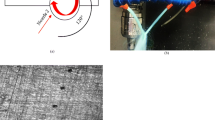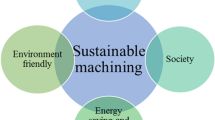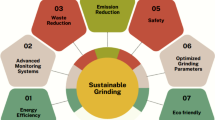Abstract
Flood cooling is a typical strategy used in the machining of difficult-to-cut materials where high temperatures are produced. Several environmental and health concerns are associated with the cutting fluids employed during this technique. Vegetable oil-based fluids appear to be the best substitute to conventional mineral/synthetic oils due to their environmentally friendly, biodegradable, renewable, and less toxic properties. Therefore, this paper attempts to establish an environmentally conscious, flood-cooling alternative through replacing conventional fluids with a synthetic vegetable ester-based (Mecagreen 450) biodegradable oil to investigate the machinability aspects of Inconel 718. In addition to the cooling environment, cutting speed (vs), feed per tooth (fz), and axial depth of cut (ap) have been used as control variables. A Taguchi L9 array has been selected for the design of experiments (DOE). Parametric effects and microscopic analyses have been carried out to investigate the three response parameters, i.e., surface roughness (Ra), tool wear, and material removal rate (MRR). Tool wear analysis is further supplemented with scanning electron microscopy (SEM) and energy-dispersive spectroscopy (EDS).







Similar content being viewed by others
References
Shokrani A, Dhokia V, Newman ST (2012) Environmentally conscious machining of difficult-to-machine materials with regard to cutting fluids. Int J Mach Tools Manuf 57:83–101
Aslantas K, Cicek A (2018) The effects of cooling/lubrication techniques on cutting performance in micro-milling of Inconel 718 superalloy. Procedia CIRP 77:70–73
Zhao J, Liu Z, Shen Q, Wang B, Wang Q (2018) Investigation of cutting temperature during turning Inconel 718 with (TiAlN) PVD coated cemented carbides tool. Materials Basel 11(8):1281
Ren XP, Liu ZQ (2016) Influence of cutting parameters on work hardening behavior of surface layer during turning superalloy Inconel 718. Int J Adv Manuf Technol 86(5):2319–2327
Zahoor S, Mufti NA, Saleem MQ, Mughal MP, Qureshi MAM (2017) Effect of machine tool’s spindle forced vibrations on surface roughness, dimensional accuracy and tool wear in vertical milling of AISI P20. Int J Adv Manuf Technol 89:3671–3679
Zahoor S, Mufti NA, Saleem MQ, Shehzad A (2018) An investigation into surface integrity of AISI P20 machined under the influence of spindle forced vibration. Int J Adv Manuf Technol 96(9-12):3565–3574
Zeilmann RP, Fontanive F, Soares R (2017) Wear mechanism during dry and wet turning of Inconel 718 with ceramic tools. Int J Adv Manuf Technol 92(5-8):2705–2714
Imran M, Mativenga PT, Gholinia A, Withers PJ (2014) Comparison of tool wear mechanisms and surface integrity for dry and wet micro-drilling of nickel-base superalloys. Int J Mach Tools Manuf 76:49–60
Sharma J, Singh SB (2014) Investigation of effects of dry and near dry machining on AISI D2 steel using vegetable oil. J Clean Prod 66:619–623
Shashidhara Y., Jayaram S. (2010) Vegetable oils as a potential cutting fluids evolution
Musfirah AH, Ghani JA, CheHaron CH (2017) Tool wear and surface integrity of Inconel 718 in dry and cryogenic coolant at high cutting speed. Wear. 376-377:125–133
Mehta A, Hemkaumar S, Patil A, Khandke SP, Kuppan P, Oyyaravelu R, Balan ASS (2018) Influence of sustainable cutting environment of cutting forces, surface roughness and tool wear in turning of Inconel 718. Mater Today Proceed 5(2):6746–6754
Leopardi G, Tagliaferri F, Rüger C, Dix (2015) Analysis of laser assisted milling (LAM) of Inconel 718 with ceramic tools. Procedia CIRP 33:514–519
Hafiz M.S.A., Kasim M.S., Mohamad W.N.F., Izamshah R., Aziz M.S.A., Akmal M., Othman I.S., Sundi S.A. (2018) Machinability ultrasonic assisted milling of Inconel 718 by Taguchi Method. ARPN J Eng Appl Sci 13(20)
Fernandez V., Navas G., Sanda A., Bengoetxea I. (2018) Comparison of machining Inconel 718 with conventional and sustainable coolant.
Iturbe A, Hormaetxe E, Garay A, Arrazola PJ (2016) Surface integrity analysis when machining Inconel 718 with conventional and cryogenic cooling. Procedia CIRP 45:67–70
Pereira O, Martin-Alfonso JE, Rodriguez A, Calleja A, Fernandez-Valdivielso A, Lopez de Lacalle LN (2017) Sustainability analysis of lubricant oils for minimum quantity lubrication based on their tribo-rheological performance. J Clean Prod 164:1419–1429
Ameen F. (2018) Prediction of surface roughness and tool wear using artificial neural networks for the green machining of Inconel 718. M. A. Sc. thesis, University of Windsor, Canada
Marques A, Guimaraes C, Batista da Silva R, Fonseca MPC, Sale WF, Machado AR (2016) Surface integrity analysis of Inconel 718 after turning with different solid lubricants dispersed in neat oil delivered by MQL. Proc Manuf 5:609–620
Hegab H, Umer U, Soliman M, Kishawy HA (2018) Effects of nano-cutting fluids on tool performance and chip morphology during machining Inconel 718. Int J Adv Manuf Technol 96:3449–3458
Nel A, David G, Alvarez PJ, Badesha S, Castranova V, Ferrari M, Godwin H, Grodzinski P, Morris J, Savage N, Scott N, Wiesner M (2011) Nanotechnology Environmental, Health, and Safety Issues. In: Nanotechnology Research Directions for Societal Needs in 2020. In: Science Policy Reports, vol 1. Springer, Dordrecht, pp 159–220
Hull M., Bowman D. (2010) Nanotechnology environmental health and safety. Risks, regulation and management [Access Online via Elsevier]
Srikant RR, Ramana VSNV (2015) Performance evaluation of vegetable emulsifier based green cutting fluid in turning of American Iron and Steel Institute AISI1040 steel—an initiative towards sustainable manufacturing. J Clean Prod 108:104–109
Lawal S, Choudhury I, Nukman Y (2014) Evaluation of vegetable and mineral oil-in-water emulsion cutting fluids in turning AISI 434 steel with coated carbide tools. J Clean Prod 66:610–618
http://www.specialmetals.com/divisions/huntington.html. Retrieved on April 2, 2019
https://www.condat-lubricants.com/product/metal-working-fluids/machining-cutting-fluids/mecagreen/. Retrieved on May 2, 2019
Kaynaka Y, Gharibib A, Lmazb U, Kluc UK, Aslantasd K (2018) A comparison of flood cooling, minimum quantity lubrication and high pressure coolant on machining and surface integrity of titanium Ti-5553 Alloy. J Manuf Process 24:503–512
Lu XH, Hu XC, Wang H, Si LK, Liu YY (2016) Research on the prediction model of micro-milling surface roughness of Inconel718 based on SVM. Ind Lubr Tribol 68(2):206–211
Qiang L, Ya-dong G, Ming C, Ming-jun L (2017) Research on surface integrity in milling Inconel 718 superalloy. Int J Adv Manuf Technol 1-4:1449–1463
Shokrani A, Newman ST (2018) Hybrid cooling and lubricating technology for CNC milling of Inconel 718 nickel alloy. Procedia CIRP 77:215–218
Addona DMD, Rayker SJ, Narke MM (2017) High speed machining of Inconel 718: tool wear and surface roughness analysis. Procedia CIRP 62:269–274
Zhu D, Zhang X, Ding H (2013) Tool wear characteristics in machining of nickel-based superalloys. Int J Mach Tool Manu 64:60–77
Shihab SK, Mubarak EMM (2016) Evaluation of surface roughness and material removal rate in end milling of complex shape. Universal J Mech Eng 4(3):69–73
Lu X, Wang F, Xue L, Feng Y, Liang S (2019) Investigation of material removal rate and surface roughness using multi-objective optimization for micro-milling of Inconel 718. Ind Lubr Tribol 71(6):787–794
Pusavec F, Kramar D, Krajnik P, Kopac J (2010) Transitioning to sustainable production—part II: evaluation of sustainable machining technologies. J Clean Prod 18:1211–1221
Acknowledgments
The authors would like to sincerely thank Dr. A. Alpas, the Director of the Tribology Research Center in the Department of Mechanical, Automotive and Materials, University of Windsor, Canada, for providing measurement facilities and many constructive comments. The authors would like to acknowledge the financial support received from the Natural Sciences and Engineering Research Council (NSERC).
Author information
Authors and Affiliations
Corresponding author
Additional information
Publisher’s note
Springer Nature remains neutral with regard to jurisdictional claims in published maps and institutional affiliations.
Rights and permissions
About this article
Cite this article
Zahoor, S., Ameen, F., Abdul-Kader, W. et al. Environmentally conscious machining of Inconel 718: surface roughness, tool wear, and material removal rate assessment. Int J Adv Manuf Technol 106, 303–313 (2020). https://doi.org/10.1007/s00170-019-04550-z
Received:
Accepted:
Published:
Issue Date:
DOI: https://doi.org/10.1007/s00170-019-04550-z




